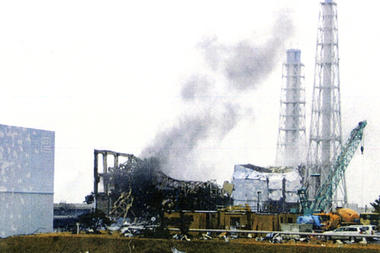Nuke Plants Prep for Aftershocks
Levels of radioactivity have risen sharply in seawater near a tsunami-crippled nuclear plant in northern Japan, signaling the possibility of new leaks at the facility, the government said Saturday.
The announcement came after a magnitude-5.9 earthquake jolted Japan on Saturday morning, hours after the country's nuclear safety agency ordered plant operators to beef up their quake preparedness systems to prevent a recurrence of the nuclear crisis.
There were no reports of damage from the earthquake, and there was no risk of a tsunami similar to the one that struck the Fukushima Dai-ichi plant March 11 after a magnitude-9.0 earthquake, causing Japan's worst-ever nuclear plant disaster.
Since the tsunami knocked out the plant's cooling systems, workers have been spraying massive amounts of water on the overheated reactors. Some of that water, contaminated with radiation, leaked into the Pacific. Plant officials said they plugged that leak on April 5 and radiation levels in the sea dropped.
But the government said Saturday that radioactivity in the seawater has risen again in recent days. The level of radioactive iodine-131 spiked to 6,500 times the legal limit, according to samples taken Friday, up from 1,100 times the limit in samples taken the day before. Levels of cesium-134 and cesium-137 rose nearly fourfold. The increased levels are still far below those recorded earlier this month before the initial leak was plugged.
The new rise in radioactivity could have been caused by the installation Friday of steel panels intended to contain radiation that may have temporarily stirred up stagnant waste in the area, Hidehiko Nishiyama of the Nuclear and Industrial Safety Agency told reporters. However, the increase in iodine-131, which has a relatively short eight-day half life, could signal the possibility of a new leak, he said.
"We want to determine the origin and contain the leak, but I must admit that tracking it down is difficult," he said.
Authorities have insisted the radioactivity will dissipate and poses no immediate threat to sea creatures or people who might eat them. Most experts agree.
Regardless, plant workers on Saturday began dumping sandbags filled with zeolite, a mineral that absorbs radioactive cesium, into the sea to combat the radiation leaks.


